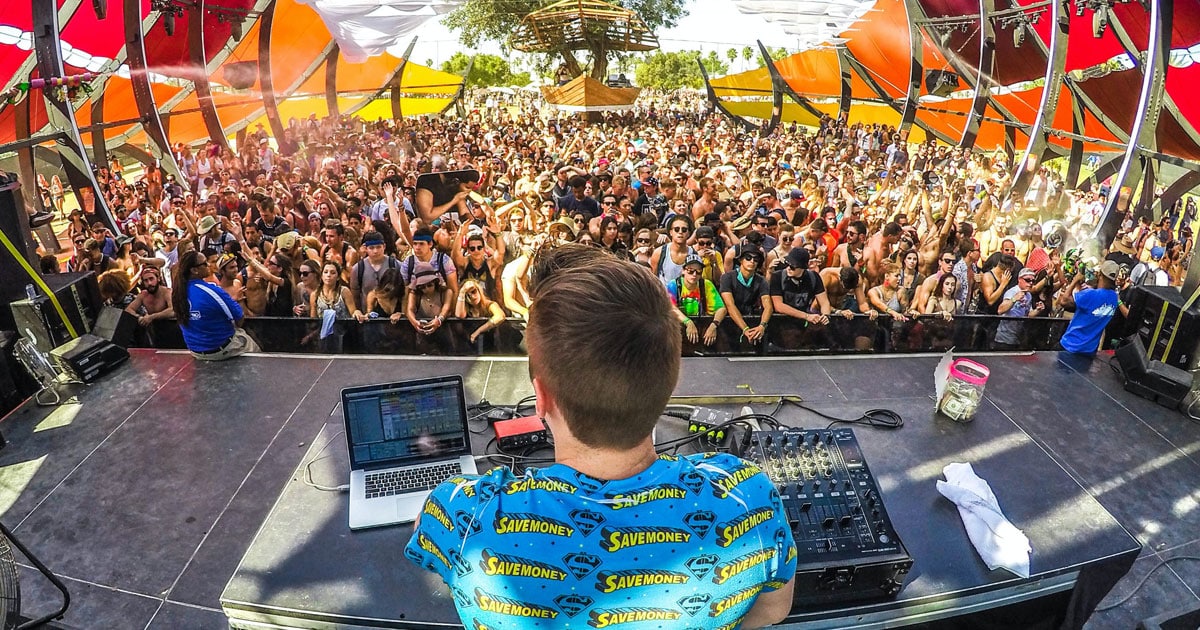Music festivals have become an integral part of our contemporary culture, bringing together music lovers worldwide to celebrate the joy of music.
Modern-day music festivals result from a long history of musical gatherings, starting from the early days of human civilization. With memorable performances, fun festival outfits, and much more, let’s look into the complete history of music festivals.

Music Festivals From the Beginning
The concept of music festivals dates back to ancient times when people gathered to celebrate religious events and mark the changing seasons. These festivals featured music, dance, and other forms of artistic expression and were often held in honor of gods and goddesses.
For instance, the ancient Greeks held music festivals, such as the Pythian Games and the Panathenaea, which featured music competitions and performances.
Music festivals continued to be associated with religious celebrations in the Middle Ages, particularly in Europe. The Catholic Church played a significant role in organizing and promoting music festivals held in cathedrals and other religious institutions. These festivals featured choral music and were often associated with religious holidays like Christmas and Easter.
The Modern Music Festival Takes Form
The modern-day music festival, as we know it, started to take shape in the 1960s with the rise of the counterculture movement.
The first music festival to gain worldwide attention was the Monterey Pop Festival, which took place in California in 1967. The festival featured performances by some of the most prominent musicians of the time, including Jimi Hendrix, The Who, and Janis Joplin.
The Monterey Pop Festival was a turning point in the history of music festivals, as it demonstrated the potential of bringing together diverse musical styles and artists to create a unique and memorable experience for audiences.
Still, the most iconic music festival of all time was undoubtedly Woodstock. Held in 1969 in upstate New York, Woodstock was a three-day celebration of music, peace, and love.
The festival attracted over 400,000 people and featured performances by some of the most influential musicians of the time, including Jimi Hendrix, Janis Joplin, and The Who. Woodstock became a cultural phenomenon, and its impact on music and popular culture is still felt today.
Expansion and Development
In the 1970s, music festivals continued to grow in popularity, with events such as the Isle of Wight Festival in the UK and the Glastonbury Festival, which started in 1970.
Glastonbury, in particular, has become one of the most popular music festivals in the world, with over 200,000 people attending each year. The festival features a diverse range of musical styles and other forms of art and culture, including theater, dance, and visual arts.
In the 1980s, music festivals became more commercialized, with major record labels and sponsors getting involved in organizing and promoting events. The Reading and Leeds Festivals in the UK, which started in the 1980s, are examples of this trend. These festivals featured a mix of established and up-and-coming artists and attracted large crowds of music fans. Festival outfits began to catch on with a unique style and rave culture aesthetic.
In the 1990s, music festivals became even more diverse, with the emergence of new musical genres such as hip-hop, electronic dance music (EDM), and world music. The emergence of new technologies, such as the internet and social media, also played a significant role in promoting and organizing music festivals.
Lollapalooza, which started in 1991, is an example of a festival that embraced this diversity, featuring a range of musical styles and artists from different backgrounds.
The New Era of Music Festivals
In the 21st century, music festivals have continued to evolve, with new events emerging and existing ones expanding and adapting to changing tastes and trends
One of the most significant developments in music festivals in recent years has been the rise of destination festivals, which attract music fans worldwide. These festivals, such as Coachella in California, Tomorrowland in Belgium, and Sziget in Hungary, offer music and a complete experience, with a range of activities, food, and other entertainment options.
In addition to destination festivals, there has been a trend towards smaller, more specialized events catering to specific musical tastes and subcultures. These events, like Afropunk in Brooklyn and Desert Daze in California, offer a more intimate and immersive experience focusing on community and creativity.
What’s Next for Festival Culture?
As we look to the future, it is clear that music festivals will continue to evolve and adapt, offering new and exciting experiences for music fans around the world. Festival outfits will only become more fun and flashy, so be sure to dress up for the occasion!
